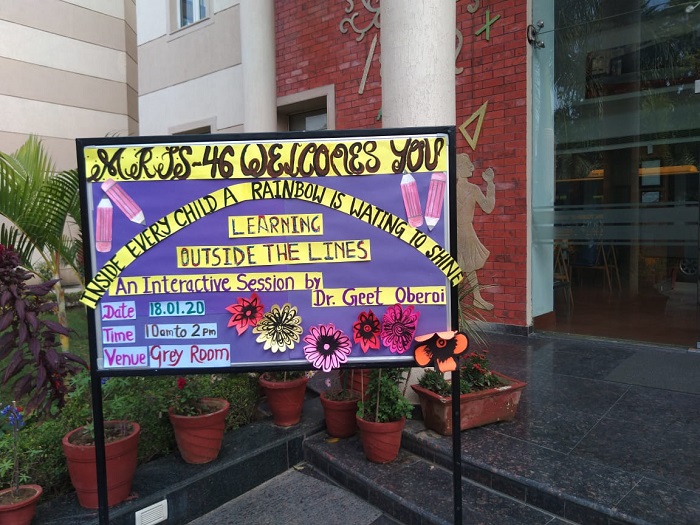Teacher workshop- Understanding what learning disability is
INSIDE EVERY CHILD A RAINBOW IS WAITING TO SHINE
Dr. Geet Oberoi, Founder of Orkids (Special Education Service Clinic) organised an interactive workshop on Understanding what Learning disability is on 18 January 2020 at Manav Rachna International School, Gurugram. 55 participants including Clinical Psychologists, Occupational Therapists, Speech Therapists, Counsellors and Special Educators attended the workshop.
An interactive and fun-filled session of 4 hours started at 10 a.m. with the explanation of the meaning of the phrase What is learning disability? The discussion moved on to how we want to see our students when they leave school. The answers were sought as adjectives like confident, mature, expressive, kind, responsible, happy etc.!
It was concluded here that we all want our students to be happy individuals. Dr Oberoi explained that learning disability is hidden as the children with learning disability look like any other children, but are different in the way they function. She mentioned that the problem is not associated with intelligence but with the way their brains are wired. This difference affects how they receive and process information.
Discussions continued about the different kinds of disabilities and their characteristics. Amongst the participants a few were parents of children with such learning disabilities and they shared their experiences and challenges.
[gallery link="file" order="DESC"]
The following learning disabilities were discussed:
1.
Dyslexia: A language and reading disability.
2.
Dyscalculia: Problems with Arithmetic and Mathematics concepts.
3.
Dysgraphia: A writing disorder.
4.
Dyspraxia: Problems with motor co-ordination.
5.
Nonverbal learning disability: Affects social and organizational skills.
Dr Oberoi tried to involve everyone in the discussion by giving a chance to ask questions. During the session an informal screening of a checklist for identifying learning disability was also done. It was based on observations and signs noticed in school going children, as observed by the participants.
The following checklists were arrived at:
1. For Dyslexia
-Difficulty in learning the names of letters and/ or sounds of alphabets.
-Inability to rhyme and to learn simple nursery rhymes.
-Reverse writing- letters b/d. saw/was.
-Reverse reading tap/pat. Bat/tab.
-Reading slow and laboured. Not age appropriate.
-Spelling errors even when copying off the board.
2. For Dysgraphia
-Poor understanding of upper and lower-case letters.
-Tight. Awkward pencil grip and body position.
-Difficulty forming letters.
-Poor organisation of written expressions.
-Spelling errors.
3.For Dyscalculia
-Unable to count and recognise beyond 100.
-Unable to compare numbers-bigger /smaller. More /less.
-Reverse reading numbers seen 31for 13. 17 for 71.
-Telling time is difficult.
-Mental math is a problem.
4. For Dyspraxia
-Uncoordinated awkward movements.
-Toilet training, particularly bowel control may be delayed.
-Delayed language development.
-Organisational skills not age appropriate.
5. For Sensory Integration Disorder
-Oversensitivity to touch.
-Sensitive to loud noises.
-Things put into the mouth.
-Sensitive to bright lights.
-Afraid of heights.
The session concluded with Dr Oberoi emphasising that children where such symptoms are observed require interventions and need to be accommodated. Intervention is required to focus on specific deficits whereas accommodation lends support to achieve this. Accommodation involves strategies to bypass a weak academic skill whereas interventions are intended to strengthen a weak skill. It was suggested that both should be deployed in ways that avoid stigmatising students.
It was a wonderful experience to be amidst like minded people where there was a lot to share and learn













